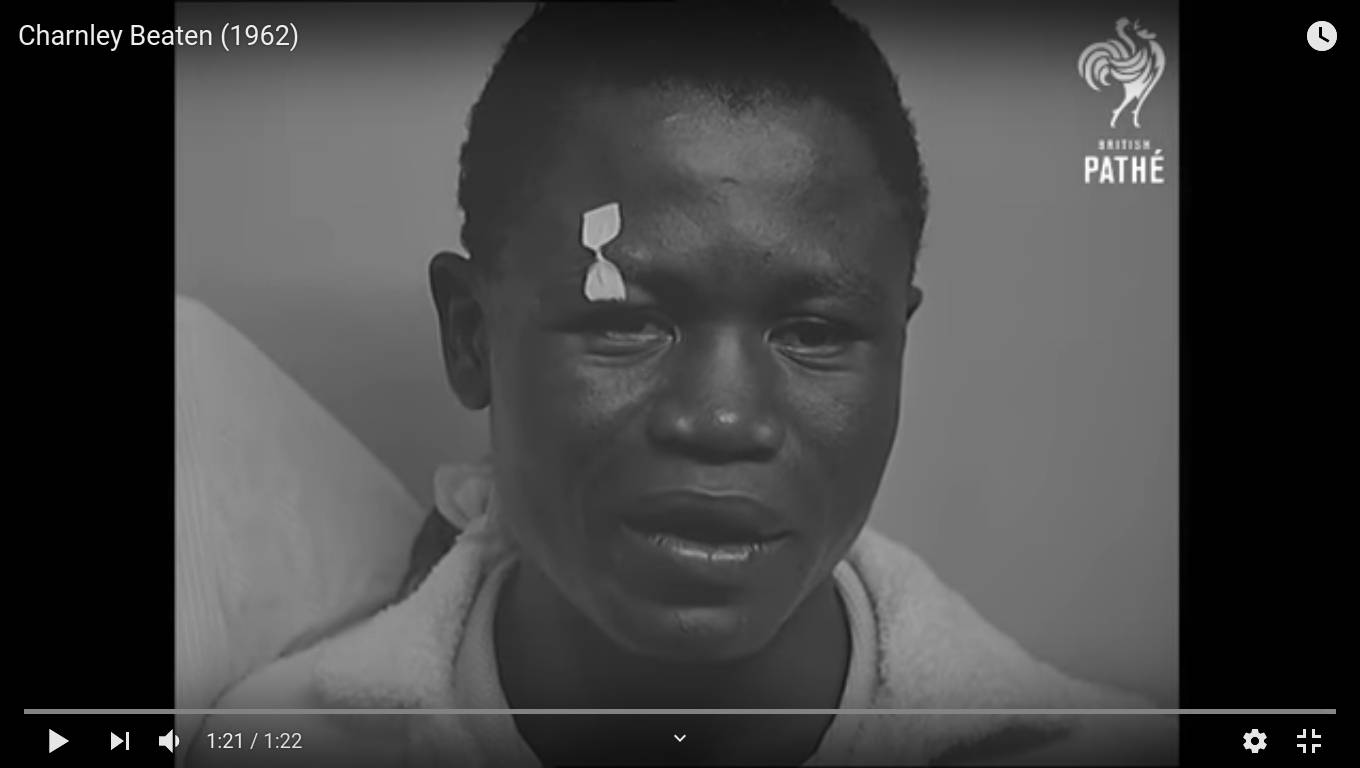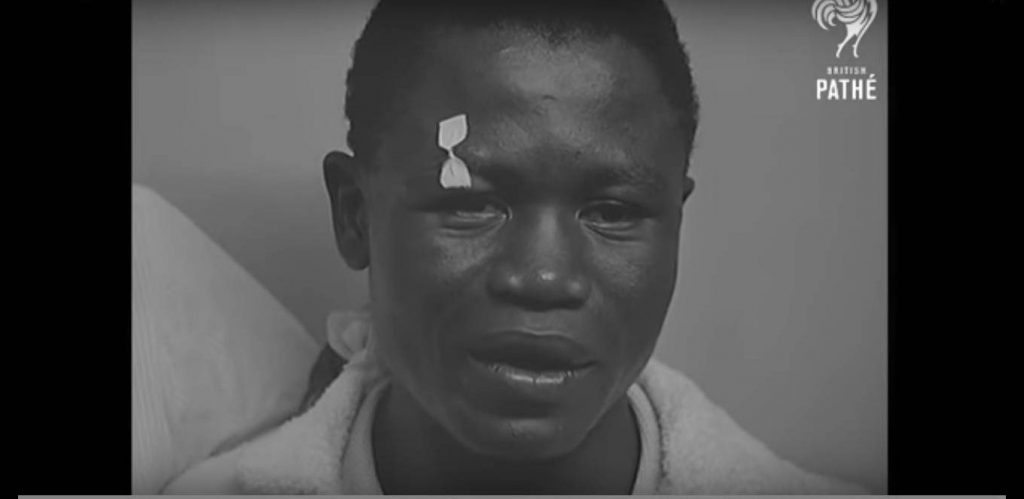
Honour Our Legends
A plea for boxing champ Bunny Grant
If you leaf through the annals of the birth of Jamaica, you’re unlikely to see the name of Bunny Grant, the prototypical gladiator, the champion battling in the arena to win freedom and glory. On the night of Saturday, August 4, 1962, while plans were being made to lower the United Kingdom’s Union flag the next night, signalling the end of 307 years of Britannia’s rule, and the raising of the new Jamaican standard of Independence, George “Bunny” Grant entered the ring to fight for the British Empire lightweight boxing crown held by the British champion, Dave Charnley, and came out the victor.
Aptly at empire’s departure and the birth of the new nation, it was a metaphorical and literal prize fight, and witnessed by captains of both camps.
If you listen to the clip above from the archives of British Pathé, it was also a contest of colour, a euphemism for race.
“Boxing’s contribution to the celebration of Jamaica’s Independence celebrations. Southpaw Dave Charnley versus the coloured Bunny Grant of Jamaica itself,” said the presenter.

Charnley, a darling of the British, if you go by the splash on the cover of the boxing mag of the day Boxing News, made £400,000 career earnings, which by the end of his life, he had converted to millions through personal business ventures.
“The night before our independence at the [newly built] National Stadium [my dad] beat Dave Charnley to take the last title in colonialism and the first title in Independence!” wrote Althea Grant, the daughter of the champion, in a post to a Facebook group the end of June. She thinks he and others like him are unsung and deserve more honour in his country where statues of the colonialists still stand, even as these icons of tyranny and colonialism are being torn down worldwide in the wake of the re-energized anti-racism protests sparked in the United States by the murder of George Floyd, a 46-year-old black man, killed in Minneapolis, Minnesota, during an arrest on May 25, 2020, for allegedly using a counterfeit bill.
“[Just] before our independence at the National Stadium he beat Dave Charnley to take the last title in colonialism and the first title in Independence! The very next day Princess Margaret arrived to preside over the independence ceremony in the SAME stadium and at midnight the British flag came down and the Jamaican standard went up but we walk under the statues of hate and glorify them!” Althea Grant wrote in her comment about a post featuring a photograph of a statue of Queen Victoria that stands downtown Kingston, the Jamaican capital.
“The statues should have been sent home with Princess Margaret,” she wrote of the white alabaster/marble statue that had been relocated to a less prominent position in a park once named for the queen under whose reign the enslaved people of the British Empire were emancipated in 1834, but which was renamed for St William Grant (no known relation of Bunny’s), a local labour leader whose activism was a major part of the move to independence. A statue of Alexander Bustamante, the man who supplanted Grant, the de facto leader of the workers, and who was knighted by Queen Elizabeth II before going on to be the country’s first prime minister, was put in Victoria’s former place of glory.
“I said to my dad in 2017 ‘there should be one of you here instead of all these whites towering over us!’ He said, ‘What fah?’ I said, ‘so that your contribution to the country through boxing would always be remembered.’
Grant was Jamaica’s lightweight and welterweight champion, the British Empire and Commonwealth light-weight champion (1962-67), former Central American light welterweight champion, and former Latin American junior welterweight champion.
“He was adamant everybody will remember him! Yet even at that time he was only remembered by [a] few older heads and they could respect him but not get the country to use him as a source of pride and an example of the many great people who rose up through grit an grime to achieve so much! Instead we have alabaster racist imperialist to admire,” Althea rued.
It is not hard for some to sympathize with her call for a more equitable treatment of those playing a part in putting Jamaica on the world map. As a member of the first cohort to enter primary (elementary) school after Independence, I recall our first grade teacher giving us dictation at Rollington Town Junior School, “Miss Jamaica Carole Joan Crawford, is Miss World,” we wrote at the instruction of Miss McCatty. “She is the most beautiful girl in the world.”
Crawford would have been classified as a white Jamaican by her phenotype, but unlike the Grant fight video presenter, Miss did not mention Crawford’s hue. Maybe because it was a beauty contest that she won, Crawford’s likeness remains iconic in Jamaica where several women of varying racial admixtures have gone on to win and feature highly in such competitions. But not Bunny Grant’s image although he was consciously embedded in the Independence programme of activities.
George Leslie Grant, was born September 29,1940, and grew up in the district of Tench Town, a poor part of the capital but rich in the talent it has given to Jamaica and the world including some of reggae music’s greatest exponents.
Althea says her father and another local boxing legend, Percy Hayles, grew up as friends being distant in-laws.
“My dad and Percy Hayles were childhood friends,” she said, and her dad related to her that they were “learning to ‘ride haas (horse) wid Missah Joe! Missah Joe was Pocco shepherd yu kno!’ [he] was telling me in 2017 as I took him around to various places trying to sort things for him after [he had a] stroke.
“And by the way, Missah Joe was my great aunt’s partner and as dad was learning to be jockey from him he met my mom and that’s how I came into the world.
“Then he said Missah Joe took him to a boxer–I can’t remember his name–but he was the best and that’s how he switched to boxing! The power of being in the right place at the right time.”
“Bunny was one of the best boxers produced by Jamaica, and his trail-blazing career influenced numerous champions since then,” Jacques Deschamps Jr, whose father, the late Jacques Deschamps Sr, managed Grant, told the Daily Gleaner a few weeks after Grant’s death November 1, 2018.
Grant was Jamaica’s lightweight and welterweight champion, the British Empire and Commonwealth light-weight champion (1962-67), former Central American light welterweight champion, and former Latin American junior welterweight champion.
Deschamps recalled two unsuccessful but “epic fights” against Eddie Perkins for the World Boxing Council (WBC) light welterweight and the World Boxing Association (WBA) World light welterweight titles.
The Gleaner mentioned some of Grant’s accolades as Jamaica’s Sportsman of the Year in 1961 and award of the Order of Distinction (Officer Class) in 2005 and the Order of Distinction (Commander Class) in the 2013 national honours for his contribution to sport in Jamaica. He had career fight statistics of 53-15-5.
Many Jamaicans were drawn to boxing pre and post Independence and there were popular gyms around Kingston’s old Race Course, George VI Memorial Park, renamed National Heroes’ Park, where Pan African hero Marcus Garvey and other Jamaican personages and political leaders are buried. These gyms and Bunny Grant’s achievements probably influenced a wave of fighters from the island including the likes of one time WBC heavyweight champion, Trevor Berbick and Mike McCallum who held world championships in three weight classes, including the WBA super welterweight title from 1984 to 1988, the WBA middleweight title from 1989 to 1991, and the WBC light heavyweight title from 1994 to 1995.
McCallum, said Grant inspired and taught him his body snatching punch that he became known for and gave him his nickname, The Bodysnatcher. (see Merryeweather video in slide at top.)
Grant had a reputation as a gentleman in and outside the ring and so was lauded in song by his friend from Trench Town, the artiste Alton Ellis. In his ska hit Dance Crasher, he urged the rude boys “Be a gentleman/You’ll be a champion/Like Mr Bunny Grant”.
[youtube=https://youtu.be/-Ctg1FK0sYE&start=65&end=75&rel=0]Coming at the time of the failure of the Federation of the West Indies, precipitated by Bustamante’s leading a referendum to pull Jamaica out, Grant’s win still had its celebrants in the other territories and he was lauded in song by the great Grenadian Trinidadian soca/calypso bard, The Mighty Sparrow.
[youtube=https://youtu.be/GXbR75DQcsY&start=15&end=48&rel=0]
“It hurts that while we seek to maintain a history that represents our subjugation we ignore Jamaicans who are also a part of our history in a more immediate way,” wrote Althea. “My dad was a true Jamaican and his legacy inspired many. He’s currently occasionally remembered but not honoured as he should.
“We rightly have a statue of Usain Bolt after he won the sprint at the 2012 Olympics here in London. That also was just before our 50th Independence [anniversary] but dad did this first and there’s a statue of Usain, very proud and great outside the National Stadium but not one of Bunny Grant or any other boxer. Yet in the annals of boxing all over the world one country’s name comes up belying its size: Jamaica!
“Boxers in UK were almost all of Jamaican descent and Dad played his part there, only to see me and him standing under this same statue of Queen Victoria [at] Parade having that discussion as he battled memory loss and stroke, a fight he lost.”

Maybe it is time to put up a fight for Bunny Grant. As Jamaica’s 58th anniversary of Independence approaches, August 6, 2020, maybe we we can create a vision of greater honour for the first Independence champion. Maybe the National Stadium, the scene of his great glory, could be named for him and or maybe a statue could be placed among the athletic pantheon at the main entrance to the scene of many a memorable Jamaican victory.
What do you believe Bunny Grant deserves in recognition of his contribution? Vote:
[cbxpoll id=”10234″]

About Mark Lee
Mark Lee has been a long-time journalist writing, editing and producing in print, radio television and new media.










